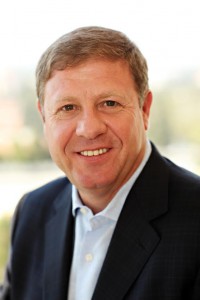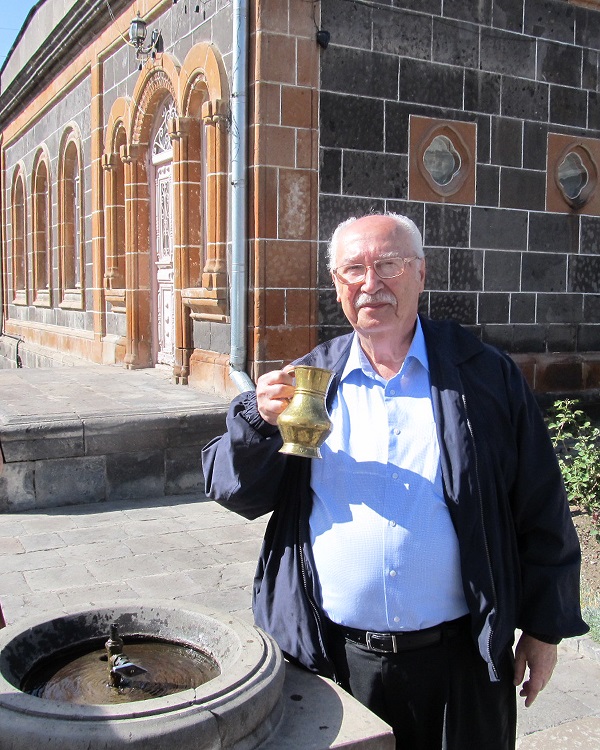
AUA Board of Trustees Member Adam Kablanian Interviewed by Asbarez
4 min read YEREVAN, Armenia – Adam Kablanian, a Board Member of the American University of Armenia (AUA)’s Board of Trustees, and Chairman of the AUA Development Committee, was recently interviewed by San Francisco Bay Area community member and Asbarez contributor, Mr. Noubar Demirjian. The English translation of the article can be read below. To see the original article in Armenian, click here.
YEREVAN, Armenia – Adam Kablanian, a Board Member of the American University of Armenia (AUA)’s Board of Trustees, and Chairman of the AUA Development Committee, was recently interviewed by San Francisco Bay Area community member and Asbarez contributor, Mr. Noubar Demirjian. The English translation of the article can be read below. To see the original article in Armenian, click here.
Interview By: Noubar Demirjian for Asbarez
It is always a pleasure and a source of pride to see Armenians succeeding in different professional fields. One such individual is Adam Kablanian, who lives in the San Francisco Bay Area; he is active in the Armenian community and a successful High Tech Entrepreneur.
Adam was born in Aleppo, Syria. He received his primary education at the Lazar Najarian-Calouste Gulbenkian School. He moved to the United States to continue his education at the University of California, Berkeley and graduated in 1983 with a degree in Physics and began working as a VLSI microchip design engineer at XICOR Corporation in Milpitas, CA. In 1989, he left his position at XICOR Corporation to earn his Master’s degree in Electrical and Computer Science from Santa Clara University. He graduated in 1992.
In 1996, Mr. Kablanian founded Virage Logic Corporation, based on his VLSI microchip design. He served as Chairman and CEO of the company, taking it public on NASDAQ (VIRL) in 2000. Mr. Kablanian holds 15 U.S. patents. His success in the high-tech industry is truly remarkable, and while we will not delve into the details of his career here, perhaps we can save that for a future interview.
In 1985, Mr. Kablanian married Rita Arejian and they are blessed with two children. His favorite pastimes are playing basketball, skiing, reading, and travel.
In 2014, Mr. Kablanian joined the Board of Trustees of the American University of Armenia (AUA), and in February 2015, he was appointed chairman of the AUA Development Committee.
Noubar Demirjian: How did your parents influence your sense of national identity and your career choice?
Adam Kablanian: My parents did not have a direct influence, however, I have inherited their zeal for hard work and sacrifice for my community and for the Armenian people.
Noubar Demirjian: What was the driving force that persuaded you to work in the technology sector?
Adam Kablanian: I came to the United States to pursue a career in physics, specifically astrophysics. However, life led me in a different direction and into the career I am in today.
Noubar Demirjian: What advice do you have for Armenian youth who are interested in pursuing a career similar to yours?
Adam Kablanian: The best advice I have is that they should be dedicated to the field of their choice, whatever it may be and pursue it with passion. At the same time, they should also serve their communities and their nation. Pursuing profit single-mindedly is not a ticket for success.
Noubar Demirjian: You were chairman of the San Francisco Bay Area Armenian Genocide Centennial Committee. What initiatives did the committee work on over the past 7-8 months?
Adam Kablanian: The committee did extensive work, organizing over 20 events. The first event took place on Saturday, December 6, 2014 at Khatchatouryan Hall in San Francisco, raising around $400,000 in donations and pledges. This event gave the necessary momentum for the other events to succeed. On Saturday, February 28, 2015, we organized a walk across the Golden Gate Bridge with nearly 1000 participants. On April 18 and 19, there was an Armenian Genocide Symposium at UC Berkeley with 12 historians from around the world. On Sunday, April 19, there was a walk from KZV Armenian School to Mount Davidson Cross where we had a commemoration program and final requiem service. On April 24, the main commemoration of the 100th anniversary of the Armenian Genocide took place at San Francisco City Hall with over 1,800 attendees inside City Hall. There were an additional 700 attendees outside, who were unable to get inside due to space constraints. The event included a cultural program, remarks by elected officials, keynote address, performance by Arax Dance Group, and other cultural components. The final component of our activities was the Cinema Armenia Film Festival that took place from May 15 to 17.
It is important to note that after the completion of all the events, the remainder of the funds raised for the centennial were donated to a number of important causes including Bird’s Nest Armenian Orphanage in Jbeil, Lebanon; Etchmiadzin Youth Association; Anjar Armenian Evangelical Orphanage; the Aleppo Orphanage; Trchunyan Orphanage in Gyumri, Armenia; the fund for construction of homes for the Syrian-Armenian refugees in Armenia; American University of Armenia AGBU Papazian Library; and some funds for the San Francisco Armenian Genocide Commemorative Committee.
Noubar Demirjian: Do you think the fact that this year is the centennial of the Genocide will be a factor in more countries to recognize it?
Adam Kablanian: It definitely has an impact. Recently, Germany, Austria, and other nations recognized the Armenian Genocide. It is my belief that the main benefit of the Genocide Centennial commemoration events around the world was a grand awakening of our youth that will lead to our national unity and future collaborations. We are here, we will endure, and we will persevere in our work.
Noubar Demirjian: We know that the Armenian government and people put in a great deal of work in organizing commemorative events for the 100th anniversary of the Armenian Genocide. What insights can you give us on the events that took place in Armenia?
Adam Kablanian: Around the world, events both large and small took place to mark the 100th anniversary of the Armenian Genocide, and they all should be commended. The events that took place in Armenia were the central and most important ones because they were on a national, statewide level. The Armenian government is there on the Armenian soil, Dzidernagapert (the Armenian Genocide memorial monument) is there, and finally, the Armenian people are there. As you know, representatives from all over the world were in Armenia for the centennial, including the presidents of four countries. I commend the events that took place in Armenia for the centennial of the Armenian Genocide. In addition, the Kardashian sisters’ visit to Armenia prior to the centennial had an impact on our global efforts for Genocide recognition.
Noubar Demirjian: What are your thoughts about the Armenian Genocide lawsuits that are currently underway, especially with regards to restoration of lands and reparations?
Adam Kablanian: I am not a lawyer. However, I find it imperative to pursue these demands because we have the foundation, we have the cause; those lands are ours, our ancestors were forcefully pushed out of those lands and sent into exile. These lands belong to us. There is no doubt about that. Our catholicosate and our government must pursue this issue.
Noubar Demirjian

